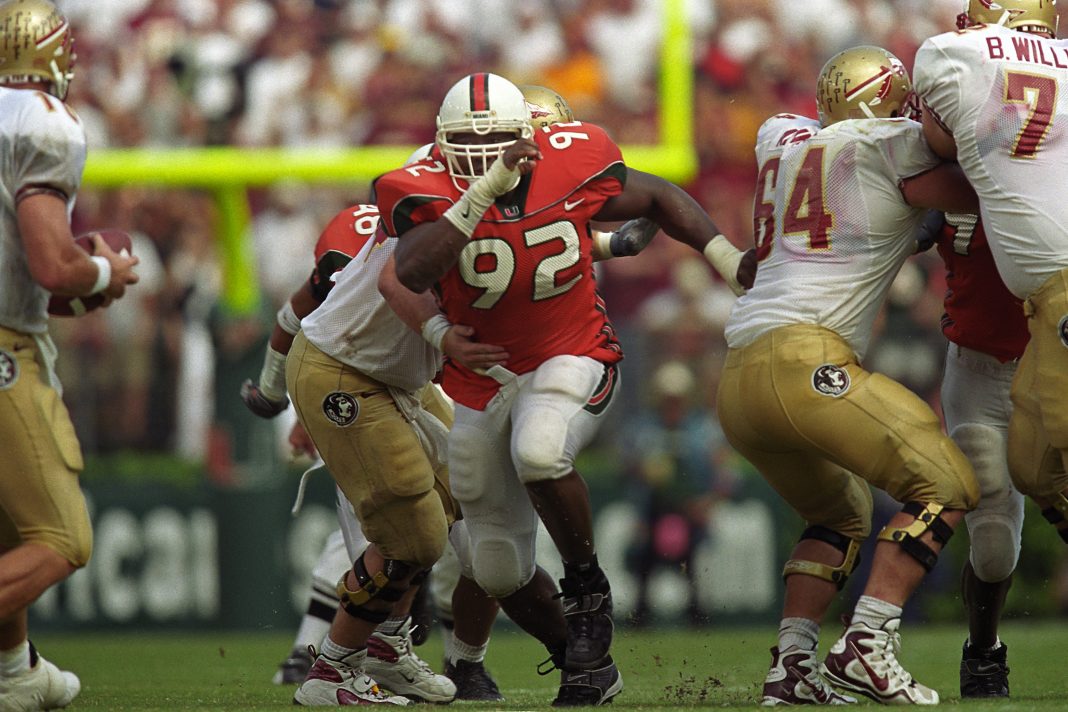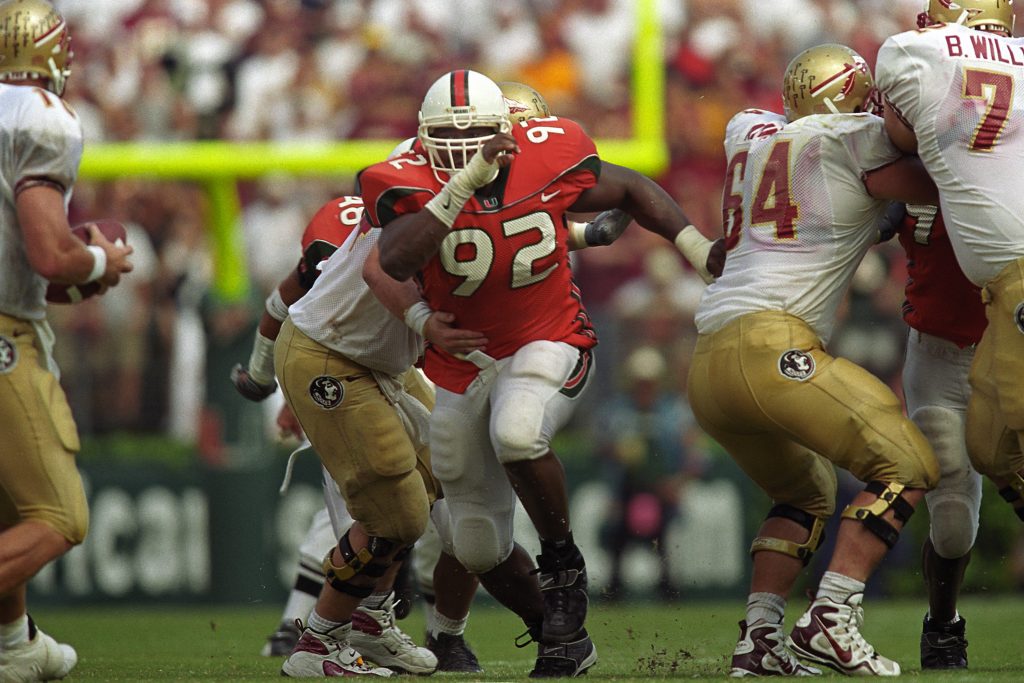

For decades, the Miami Hurricanes and the Florida State Seminoles have had one of the most distinguished rivalries in all of college football. From blown leads and miraculous comebacks to tightly-contested duels on the gridiron, history has proven time and again that any match between these two powerhouses is bound to be an exhilarating blockbuster.
The Hurricanes and Seminoles first began their battle for state supremacy in 1951, when Miami blew out Florida State 35-13. Since then, the two programs have competed in 64 additional games, with 31 of them being decided by one possession or less.
UM narrowly leads the all-time series with a record of 35-30, which was brought within one game in 2016. In 2010, the Seminoles embarked on a seven-game, seven-season win streak over the Canes. Throughout that span, Florida State stifled Miami’s offense, keeping the Hurricanes under 20 points on four occasions. UM has since gotten the best of their cross-state foe, winning the past four contests.
The heated rivalry that burns to this day between UM and FSU began in the 1980s, when both programs began to assert themselves as two of the best in the nation.
The early ‘80s pitted legendary coaches Howard Schnellenberger and Bobby Bowden against each other. Schnellenberger and the Hurricanes stacked the win column early and often, claiming a 3-1 record over the Seminoles from 1980 through 1983, when the Hurricanes earned their first national championship.
The following year, Florida State retaliated and humbled the defending national champions with a crushing 38-3 victory as Miami adapted to the new leadership of head coach Jimmy Johnson. The Hurricanes then went on to win the next four contests through 1988.
In 1987, the UM-FSU rivalry reached a climax. In front of a sold-out crowd in Tallahassee, No. 3 Miami and No. 4 Florida State competed on a field that featured more than 60 future NFL players, 10 of which were first-round draft selections.
The Seminoles led the game 19-3 with 16 minutes remaining, but in classic Hurricanes fashion, Miami owned the fourth quarter. Halfway through the fourth quarter, UM narrowed the deficit on a touchdown pass from quarterback Steve Walsh to Michael Irvin. The Canes then tied the game on a two-point conversion, and four plays later, Walsh and Irvin combined for a 73-yard touchdown to take a 26-19 lead.
With 42 seconds on the clock, Florida State quarterback Danny McManus found Ronald Lewis in the end zone, cutting the deficit to one. However, instead of going for the tie, Bowden made a last-minute executive decision to attempt a two-point conversion and go for the win.
“We had the extra-point team in, but I changed my mind. We had missed so many [kicks] today and the wind was really affecting our kicker,” Bowden said. “I was just afraid of missing it.”
An incomplete pass on the subsequent play shut the door on the Seminoles, rewarding the Canes a much-needed win in what would become their second championship season. Florida State went on to win the rest of their games, finishing the season with an 11-1 record and second place in national polls.
After being blown out 31-0 in 1988, Florida State got their revenge in 1989 with a 24-10 victory over Miami, snapping a four-game losing streak. However, the Hurricanes ultimately got the last laugh and went on to win their third national championship of the decade later that season.
In 1991, the UM-FSU rivalry reached another peak on a day that lives in eternal infamy for Florida State fans. The No.1 Seminoles (10-0) hosted the No. 2 Hurricanes (8-0) in a game that was held close all throughout. With under a minute remaining on the clock and Miami leading 17-16, Florida State kicker Gerry Thomas missed a 34-yard field goal, sending the Seminoles home with their first loss of the season.
The Hurricanes remained undefeated for the rest of the season and secured a fourth national title by shutting out the Nebraska Cornhuskers 22-0 in the Orange Bowl.
“To win one national championship is amazing. For guys to win their second in three years, that hasn’t been accomplished by many,” Dennis Erickson, UM Football’s head coach said in 1991. “That’s what makes this championship special, and it came in a situation where we had not been picked to be that good. Some people said we’d be No. 3 in the state of Florida.”
As if one game-deciding missed field goal wasn’t enough, the UM-FSU rivalry features five crucial games decided by whiffed field goals, which Canes fans have coined the “Wide Right” and “Wide Left” games.
The second of the series took place the next year. This time, however, the wide-right field goal attempt would have tied the game, as opposed to scoring the go-ahead points.
“There was no need to look,” Florida State kicker Dan Mowrey said. “I knew the moment I hit it that it was no good.”
The Seminoles ultimately fell to the Hurricanes 19-16. All was not lost, however, as FSU finished the year ranked second in the country after losing the national championship to the Alabama Crimson Tide.
Florida State dominated Miami and all of college football throughout the rest of the decade. From 1993 through 1999, FSU went 6-1 against UM and claimed its first two national titles.
In 2000, however, Wide Right III turned the tide in Miami’s favor and sparked a six-game win streak over Florida State that lasted until 2006. Within that span, UM earned its fifth national championship in 2001, dominating Nebraska once again with a 37-14 victory. Florida State’s trend of missed field goal attempts also continued into the next century with Wide Left I in 2002 and Wide Right IV in the 2004 Orange Bowl.
Since then, the Hurricanes have struggled to replicate their success versus Florida State, and every other team. Canes Football will enter the 2021 season having gone 6-10 versus FSU since 2004. The team has been mired in a 19-year championship drought since winning five titles in under 20 years. In Miami’s absence from championship contention, FSU added its third title in 2013 to tie the University of Florida for second most in the state.
While recent history has heavily favored the Seminoles, in 2018 the Hurricanes gave them an all-too-familiar taste of nostalgia that was bitter for FSU fans and sweet for UM fans.
Florida State led 27-7 in the second half, before Miami’s defense and quarterback N’Kosi Perry converted two FSU turnovers into touchdowns to bring the score to 27-21. At the start of the fourth quarter, the Canes erased their 20-point deficit for good with another touchdown pass to current Houston Texan Brevin Jordan, taking a one-point lead at 28-27. Then, of course, FSU crumbled under the pressure, missing yet another game-deciding field goal and surrendering the win to UM.
While the one-point thriller, now dubbed as Wide Left II, may have been a painful reminder of the past for Florida State fans, it was a comforting one for Miami fans. It proved that the rivalry between UM and FSU is still alive and well, and if history truly does repeat itself – as it has for 20 years – then there will certainly be another wide field goal attempt from the Seminoles in the future.
The win for Miami also granted the Canes their first win streak over Florida State since 2005, and it remains intact going into the 2021 season. In last season’s duel, the heated rivalry gave way to domination, as the Hurricanes bulldozed the Seminoles with a 52-10 victory at Hard Rock Stadium.





